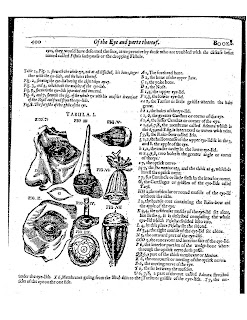When the sonnet came to England in the sixteenth century, it was a love lyric. Poets like Donne and Herbert used it for devotional poems, and Milton expanded the form further by using it to write about public figures and political topics as well.
 |
| Parts of the eye, from a 1631 anatomy text. |
Milton's most famous sonnet, "When I Consider How My Light Is Spent" (c. 1652), has different kind of connection to Shepard's autobiography. Shepard tells of the loss and restoration of his infant son's vision. Interpreting this event as God's work, Shepard turns it into an admonishment to the son to "remember to lift up thy eyes to heaven" and "take heed thou dost not make thy eyes windows of lust" (39). Milton, who lost his vision in his early forties, also uses blindness as the starting point for a conversation about God's plan for him in this poem. In another sonnet, he attributes the loss of his sight to having "overply'd" his eyes "in libertyes defence." (He also withheld this poem from publication, probably because of its reference to his part in the revolution.) We will see how Milton's blindness becomes symbolic in Paradise Lost also. Does interpreting literal, worldly experiences as expressions of divine will seem different in a self-consciously literary work than it does in an autobiography?
No comments:
Post a Comment